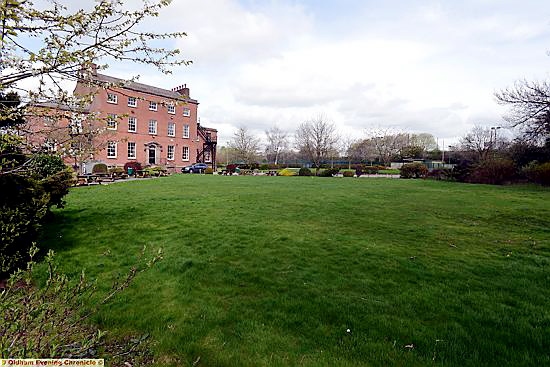‘Good Life’ plans for Lancaster Club site
Reporter: Richard Hooton
Date published: 10 April 2014

The Lancaster Club and surounding land: new garden suburb?
AN ambitious vision to transform Failsworth’s Lancaster Club site into a 21st century garden suburb has been unveiled by the council.
Officials want to create a distinctive neighbourhood with the best of town and country living at the eight hectare (20 acre) site, at the heart of which is the Grade II-listed former Failsworth lodge.
The project aims to apply many of the early-20th century town-planning principles used for places such as Hampstead Garden Suburb in London and the Wavertree Garden Suburb in Liverpool, both widely praised.
But the new suburb would use modern design and eco-friendly technology alongside traditional elements such as allotments, to create a leafy, “green” suburb.
The council already has outline planning permission to create a residence-led, mixed-use development on the site, on the Oldham-Manchester boundary off Broadway.
Developers are now being invited to register interest in working with the council on the development.
The council says residents and partners would help to identify and design facilities that would become the heart of the community.
Council leader Councillor Jim McMahon said: “This is a really exciting opportunity for a forward-thinking developer to work with us. There is growing national interest in revisiting the garden suburb approach and this could be a really significant scheme.
“Those original principles can help to meet modern challenges and create a high-quality and sustainable community with a range of housing — all in a neighbourhood environment where people will aspire to live.”
::THE garden suburb concept grew out of the original garden cities movement developed in the late 1800s.
The Oldham Garden Suburb was one of the first members of the Garden Cities Association and opened on Hollins Road in August 1909 - thanks largely to the work of Mary Higgs, founder of the Beautiful Oldham Society.
The community spirit of Oldham Garden Suburb is still going strong — 105 years after it was founded — with regular social events and activities still run entirely by volunteers.
Most Viewed News Stories
- 1Punch perfect Kyle is Oldham's latest national boxing champ
- 2Milan Bar in Lees and The Bank at Delph close doors with immediate effect
- 3Group wanted following attempted robbery incident on a tram in Shaw
- 4Five arrested after two young victims are robbed
- 5Shaw prospect Rafferty aims to shine at massive 'Ring Warriors Unleashed' show




